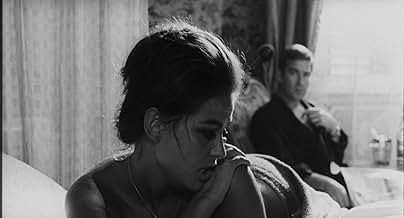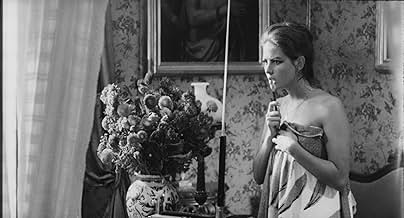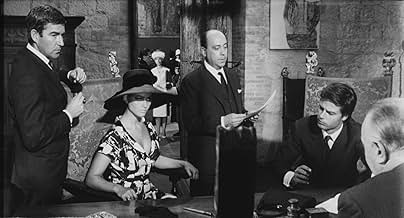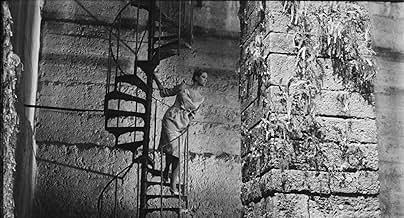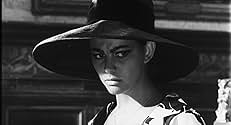IMDb RATING
7.1/10
2.4K
YOUR RATING
Sandra returns to her childhood village to take care of family business, but her childhood memories and secrets soon overcome her.Sandra returns to her childhood village to take care of family business, but her childhood memories and secrets soon overcome her.Sandra returns to her childhood village to take care of family business, but her childhood memories and secrets soon overcome her.
- Awards
- 3 wins & 2 nominations total
Oscar Brazzi
- Party Guest
- (uncredited)
Glenn Saxson
- Party Guest
- (uncredited)
Featured reviews
***User-reviewer bennyraldak ("Forbidden desire", bennyraldak from Netherlands, 4 September 2009) sees "Sandra" as being focused on Claudia Cardinale's character's demons. Ilpo Hirvonen ("The decay of an aristocratic family", Ilpo Hirvonen from Finland, 21 September 2010) has a good general summary.***
Luchino Visconti's Sandra (1965), is a puzzling but splendorous visual treat that depicts incest, homo-eroticism, madness and collaboration with the Nazis. Its fairly slow pacing and reluctance to make obvious useful information will challenge those who spend hours a day gazing down at their QWERTY devices. However, "Sandra" is very rich and satisfying; it is flawlessly served up by the great Visconti. (I like it more than "The Leopard.")
A modernized retelling of the Greek myth Electra, an attractive, upper-class, socialite couple (Claudia Cardinale in the eponymous role, Michael Craig as her husband Andrew) return to the mansion of Sandra's youth (which she was forced to flee), to attend a small ceremony honoring her father, who was murdered by the Nazis at a concentration camp. When she is reunited with her unstable brother, Gianni (Jean Sorel), the physical connection between them is made very obvious. Their closer-than-normal relationship is never a secret to the audience, but revealing it is a big concern to Andrew and other observers, such as Sandra's barrister stepfather Gilardini (Renzo Ricci). The perpetually nervous Gilardini and Sandra's clinically insane mother (Marie Bell) may also have collaborated with the Nazis by betraying Sandra's father, creating an unusual conflict of pairs.
Shot in high-contrast Black and White, Visconti's skill at shooting his photogenic cast in tight quarters is evident. Because the English translation of the film is somewhat talky, it helps to develop the skill of quickly reading the subtitles in order to enjoy Visconti's work. It is amazing how precise and detailed the imagery is. The scenes between the anguished brother and steely sister are frequently filled with erotic tension. Visconti's trademark homo-eroticism is also present, but to a smaller degree.
One of the more interesting characters is Sandra's "first love" who is now a physician. He seems to personify not just a mixture of Sandra's husband and her brother, but also the Nazi collaborator Gilardini. At least, that's my interpretation of the final image.
Visconti's depiction of a decaying aristocratic family has great depth, and fans of the great director will not be disappointed with it.
Luchino Visconti's Sandra (1965), is a puzzling but splendorous visual treat that depicts incest, homo-eroticism, madness and collaboration with the Nazis. Its fairly slow pacing and reluctance to make obvious useful information will challenge those who spend hours a day gazing down at their QWERTY devices. However, "Sandra" is very rich and satisfying; it is flawlessly served up by the great Visconti. (I like it more than "The Leopard.")
A modernized retelling of the Greek myth Electra, an attractive, upper-class, socialite couple (Claudia Cardinale in the eponymous role, Michael Craig as her husband Andrew) return to the mansion of Sandra's youth (which she was forced to flee), to attend a small ceremony honoring her father, who was murdered by the Nazis at a concentration camp. When she is reunited with her unstable brother, Gianni (Jean Sorel), the physical connection between them is made very obvious. Their closer-than-normal relationship is never a secret to the audience, but revealing it is a big concern to Andrew and other observers, such as Sandra's barrister stepfather Gilardini (Renzo Ricci). The perpetually nervous Gilardini and Sandra's clinically insane mother (Marie Bell) may also have collaborated with the Nazis by betraying Sandra's father, creating an unusual conflict of pairs.
Shot in high-contrast Black and White, Visconti's skill at shooting his photogenic cast in tight quarters is evident. Because the English translation of the film is somewhat talky, it helps to develop the skill of quickly reading the subtitles in order to enjoy Visconti's work. It is amazing how precise and detailed the imagery is. The scenes between the anguished brother and steely sister are frequently filled with erotic tension. Visconti's trademark homo-eroticism is also present, but to a smaller degree.
One of the more interesting characters is Sandra's "first love" who is now a physician. He seems to personify not just a mixture of Sandra's husband and her brother, but also the Nazi collaborator Gilardini. At least, that's my interpretation of the final image.
Visconti's depiction of a decaying aristocratic family has great depth, and fans of the great director will not be disappointed with it.
After a farewell party, Sandra Dawson (Claudia Cardinale) and her American husband Andrew Dawson (Michael Craig) travel to her hometown in the province of Volterra for a homage of the locals to her father, a prominent scientist that died in the concentration camp of Auschwitz. The couple is welcomed by the maid Fosca (Amalia Troiani), and Andrew becomes fascinated with the house. Sandra has issues with her stepfather Pietro Formari (Fred Williams) and her insane mother (Marie Bell) and misses her brother Gianni Wald-Luzzati (Jean Sorel), who is an aspirant writer. When Gianni appears in the house out of the blue, Andrew unravels a shadowy secret from the past of the siblings.
The unknown "Vaghe Stelle dell'Orsa..." is another great movie of this artist called Luchino Visconti. The plot about incestuous relationship and family issues in the hands of another director could have become a melodramatic soap-opera. But Visconti explores the sensuality and beauty of Claudia Cardinale to deliver an intriguing and quite erotic family drama without any redemption. The set decoration, as usual, is another piece of art, supported by a classy music score. My vote is eight.
Title (Brazil): Not Available
The unknown "Vaghe Stelle dell'Orsa..." is another great movie of this artist called Luchino Visconti. The plot about incestuous relationship and family issues in the hands of another director could have become a melodramatic soap-opera. But Visconti explores the sensuality and beauty of Claudia Cardinale to deliver an intriguing and quite erotic family drama without any redemption. The set decoration, as usual, is another piece of art, supported by a classy music score. My vote is eight.
Title (Brazil): Not Available
Deserved the Golden Lion at Venice. Powerful at all times except for its below average beginning. Then it changes gears.
The film is typical Visconti--a well-to-do upper class family returning to the childhood manor, picking up the memorable pieces of a rich and comfortable past before the World War II (literally in the film, the sale of valued paintings, property, and in this film, a garden that needs costly upkeep forcing the family now to gift it to the townsfolk as public property). Touches of Visconti's and Lampedusa's "The Leopard" made just before this film.
The original head of the family, Sandra's father was a Jew, and executed by the Nazis. He was exposed as a Jew by his wife, a famous pianist who fell in love with a lawyer. Sandra suspects the lawyer and her mother for her father's demise. Visconti never reveals why the Nazis spared the family members. Now Sandra's mother is demented and her father's statue in the garden is always covered in a white sheet giving the suggestion of a ghost. But the film is not about ghosts.
The film is more about Sandra (Cardinale) and her brother Gianni (Sorel) who reveal an past that might never have been consummated. Now that Sandra is married to Andrew (Craig), Gianni removes the wedding ring from Sandra's finger and wears it, Sandra's protests unheeded.
Visconti's script reveals that Sandra had a lover, Antonio (who still adores her, played by Ricci), but they could not marry because of the class divide and opposition from her mother to the relationship. Years later Antonio becomes a doctor who treats Sandra's demented mother.
While the film is not about ghosts, it is about a dark past, bitter memories, class and religious conflicts, that struggle to keep pace with the world outside the Italian town with a rich history. An electra complex emerges like a ghost--Visconti's images of Cardinale's body (especially her eyes that wonder who is outside her bedroom door) are absolutely top notch. There is no overt sex, no on screen and even the spoken words deny more than underscore it. you wonder about Sandra's mother if she is truly demented when she accuses her daughter Sandra of slithering in like a serpent.
Every bit of the film makes you wonder as you clutch at the straws the director throws as clues for the viewer to solve a big puzzle. The poem which provides the original Italian title of the film is one, There are more Solve them and you will love the film. Deserving of the Venice honor. Thank you, Cardinale and Sorel, for your unforgettable screen time in this film. A film that anticipates Visconti's "The Damned" and "Conversation Piece."
The film is typical Visconti--a well-to-do upper class family returning to the childhood manor, picking up the memorable pieces of a rich and comfortable past before the World War II (literally in the film, the sale of valued paintings, property, and in this film, a garden that needs costly upkeep forcing the family now to gift it to the townsfolk as public property). Touches of Visconti's and Lampedusa's "The Leopard" made just before this film.
The original head of the family, Sandra's father was a Jew, and executed by the Nazis. He was exposed as a Jew by his wife, a famous pianist who fell in love with a lawyer. Sandra suspects the lawyer and her mother for her father's demise. Visconti never reveals why the Nazis spared the family members. Now Sandra's mother is demented and her father's statue in the garden is always covered in a white sheet giving the suggestion of a ghost. But the film is not about ghosts.
The film is more about Sandra (Cardinale) and her brother Gianni (Sorel) who reveal an past that might never have been consummated. Now that Sandra is married to Andrew (Craig), Gianni removes the wedding ring from Sandra's finger and wears it, Sandra's protests unheeded.
Visconti's script reveals that Sandra had a lover, Antonio (who still adores her, played by Ricci), but they could not marry because of the class divide and opposition from her mother to the relationship. Years later Antonio becomes a doctor who treats Sandra's demented mother.
While the film is not about ghosts, it is about a dark past, bitter memories, class and religious conflicts, that struggle to keep pace with the world outside the Italian town with a rich history. An electra complex emerges like a ghost--Visconti's images of Cardinale's body (especially her eyes that wonder who is outside her bedroom door) are absolutely top notch. There is no overt sex, no on screen and even the spoken words deny more than underscore it. you wonder about Sandra's mother if she is truly demented when she accuses her daughter Sandra of slithering in like a serpent.
Every bit of the film makes you wonder as you clutch at the straws the director throws as clues for the viewer to solve a big puzzle. The poem which provides the original Italian title of the film is one, There are more Solve them and you will love the film. Deserving of the Venice honor. Thank you, Cardinale and Sorel, for your unforgettable screen time in this film. A film that anticipates Visconti's "The Damned" and "Conversation Piece."
Luchino Visconti often dealt with the disintegration of family in his films; The Damed, The Leopard, Conversation Piece.. The stories were tragedies and only in Bellissima (1951) the family sticked together in the end. Sandra (Vaghe stelle dell'Orsa...) is also a film about this, but specifically about an aristocratic family full of betrayal, decay and immorality.
Incest is a leading theme in Sandra; we are given clues about it throughout the film, but not a definite proof. The affair of the siblings remains in the shadows and there's something odd in the relationships between the children and the parents. Visconti first approaches this controversial theme calmly, showing it as a small thing - we are not told much about it. But then he increases it to enormous dimensions.
Luchino Visconti sets this story to a dying city around a aristocratic class that is dying out. Great tragedies, misfortunes and decay lead this class to extinction. Already in Senso Visconti achieved an aesthetic revolution, but he continues this in Sandra with a political and ethic revolution. Sandra is not the easiest film by Visconti and many people in the theater seemed to neglect it. In the beginning I found it a little unreachable and absurd but it grew up to be a beautiful allegorical description of the decay of an aristocratic family.
Incest is a leading theme in Sandra; we are given clues about it throughout the film, but not a definite proof. The affair of the siblings remains in the shadows and there's something odd in the relationships between the children and the parents. Visconti first approaches this controversial theme calmly, showing it as a small thing - we are not told much about it. But then he increases it to enormous dimensions.
Luchino Visconti sets this story to a dying city around a aristocratic class that is dying out. Great tragedies, misfortunes and decay lead this class to extinction. Already in Senso Visconti achieved an aesthetic revolution, but he continues this in Sandra with a political and ethic revolution. Sandra is not the easiest film by Visconti and many people in the theater seemed to neglect it. In the beginning I found it a little unreachable and absurd but it grew up to be a beautiful allegorical description of the decay of an aristocratic family.
Great film about dark secrets and forbidden desire. Luchino Visconti depicts the life of a beautiful woman caught between her past and her present. Underneath her beauty she turns out to be filled with ugly and painful memories. Sandra (played by Claudia Cardinale) struggles with obscure feelings of guilt, alienation and questionable longings. After she takes her husband to her childhood home she finds herself thinking about her painful past. When her somewhat estranged brother shows up things turn out to be more obscure. Hidden secrets and feelings from the past seem to float to the surface once again. The o so beautiful Sandra turns out to be a complex and mysterious woman. A little more raw than most of Visconti's work, but still beautiful and authentic. A film about a woman struggling with her demons, both inside and outside of her.
Did you know
- TriviaOne of the first films in which Claudia Cardinale, who was born in Tunisia and whose first language was French, dubbed herself in Italian.
- Quotes
Gianni Wald-Luzzati: Why can't you be honest for once? Did God tell you to become a nun? Did he tell you to get married and that would satisfy you? Did he tell you that nun's are sick with desire and frustration? That they're willing to mortify their flesh? Now, why must you torment yourself? Why should you fill so full of guilt? So wretched and alone?
- ConnectionsFeatured in Visconti (1967)
- SoundtracksPrelude, chorale and fugue
Written by César Franck
- How long is Sandra?Powered by Alexa
Details
- Release date
- Countries of origin
- Official site
- Languages
- Also known as
- Vagues étoiles de la grande ourse
- Filming locations
- Geneva, Canton de Genève, Switzerland(opening sequence: party at Sandra and Andrew's apartment)
- Production companies
- See more company credits at IMDbPro
Box office
- Gross worldwide
- $927
- Runtime1 hour 45 minutes
- Color
- Sound mix
- Aspect ratio
- 1.66 : 1
Contribute to this page
Suggest an edit or add missing content


